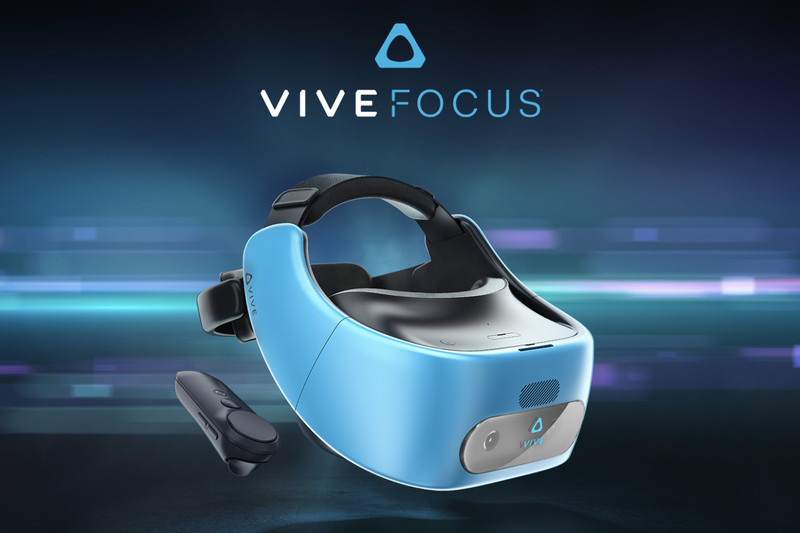HTC Brings Vive Wave Platform Stateside Ahead of Vive Focus Headset
Last year, HTC revealed Vive Wave, which would be the underlying software platform for the Vive Focus standalone headset. Developers in China have had access to the Vive Wave SDK for nearly a year, but the rest of the world has been waiting for access to HTC’s development tools. Today, HTC finally released the SDK to the rest of the world to enable developers to prepare for the North American and European releases of the Vive Focus headset.
The Vive Wave platform consists of industry standards for software development and hardware support, universal distribution guidelines and a software developer resource hub. Vive Wave is also an open platform, which can support any mobile VR headset from any manufacturer.
HTC hasn’t yet announced the launch date of the Vive Focus but originally said the device would be available before the end of the year, which doesn’t give developers much time to port their wares.
HTC Vive Wave SDKs
Fortunately, HTC made the Vive Wave SDK simple for developers of all platforms to pick up with ease. The SDK breaks down into five individual SDKs to make it easy for developers and manufactures to adopt:
- Wave Native SDK is Android-based and suitable for Android developers.
- Wave Unity SDK is a plugin for the Unity game engine.
- Wave UE4 SDK is a plugin for Unreal Engine 4.
- Wave PluginKit SDK is for accessory developers who wish to support the Vive Wave platform.
- Wave OEM SDK is for headset manufacturers who want to use the Vive Wave platform for their device.
HTC optimized the Vive Wave platform for mobile VR devices of all kinds. The platform supports standalone HMDs. It can work with slot-in headsets that utilize a smartphone’s display and processing power and works with smartphone-powered tethered headsets.
HTC’s Vive Wave platform introduces several technologies and standards to mobile VR devices that should aid to unify the market and help ease consumers' confusion. The platform supports a sub-20ms motion to photon tracking, 3- and 6-degrees of freedom controllers, Asynchronous TimeWarp reprojection technology and lens distortion and chromatic aberration correction. It also includes tracking prediction technology for standalone headsets and a virtual safety wall, like the Vive’s Chaperone system.
Get Tom's Hardware's best news and in-depth reviews, straight to your inbox.
Kevin Carbotte is a contributing writer for Tom's Hardware who primarily covers VR and AR hardware. He has been writing for us for more than four years.
-
LeeRains Thanks for that explanation Bit User. Really interesting stuff. I’ve been trying to figure out the differences between RISC and CISC, ARM and x86 tonight—in the broadest sense—because the apparent power of this new a12X has made me wonder wtf is actually going on wrt processor differences, since some of Apple’s claims don’t make sense to me.Reply
I found an article saying that ARM’s highly touted Cortex A76 SoC, which won’t even exist in the flesh until sometime next year, will, best case, be able to compete with an i5-7300? If that’s the case, how can Apple’s current a12X be marketed as faster than almost all laptops, including some core i7 cpu’s?
Even if the a12X is really amazing, how long would it take Apple to build an ARM processor that can compete with Intel or AMD’s best i7/i9 and Ryzen 2 chips?
Would it even be worth the fight? Apple became the worlds first trillion dollar corporation purchasing processors from other companies... So it seems their competitive advantage (or energy and resources) are best spent designing the types of consumer products that have no rival in terms of hardware quality and UI and UX? I don’t know much about this stiff, but it’d be fascinating to hear some other opinions! -
bit_user Heh, wrong thread. But I saw it anyway.Reply
Don't worry about RISC vs. CISC. The terms have gotten muddled and don't mean as much as when they were originally coined.21446126 said:I’ve been trying to figure out the differences between RISC and CISC, ARM and x86 tonight—in the broadest sense—because the apparent power of this new a12X has made me wonder wtf is actually going on wrt processor differences,
Here are some good sites, if you like reading about the guts of modern CPUs:
https://en.wikichip.org/wiki/WikiChip
https://www.anandtech.com/SearchResults?q=deep+dive
